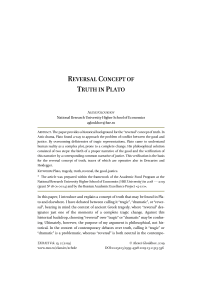Reversal concept of truth in Plato
Автор: Gloukhov Alexei
Журнал: Schole. Философское антиковедение и классическая традиция @classics-nsu-schole
Рубрика: Статьи
Статья в выпуске: 2 т.13, 2019 года.
Бесплатный доступ
The paper provides a historical background for the “reversal” concept of truth. In Attic drama, Plato found a way to approach the problem of conflict between the good and justice. By overcoming deficiencies of tragic representations, Plato came to understand human reality as a complex plot, prone to a complete change. His philosophical solution consisted of two steps: the birth of a proper narrative of the good and the verification of this narrative by a corresponding common narrative of justice. This verification is the basis for the reversal concept of truth, traces of which are operative also in Descartes and Heidegger.
Plato, tragedy, truth, reversal, good, justice
Короткий адрес: https://sciup.org/147215827
IDR: 147215827 | DOI: 10.25205/1995-4328-2019-13-2-513-536
Список литературы Reversal concept of truth in Plato
- https://nsu.ru/classics/schole/13/13-2-gloukhov.pdf
- Cottingham, John, Dugald Murdoch, Robert Stoothoff, and Anthony Kenny (1984) The Philosophical Writings of Descartes 2. Cambridge University Press.
- Heidegger, Martin (1977) The Question Concerning Technology, and Other Essays. Harper & Row.
- Heidegger, Martin (1998a) Gesamtausgabe: Logik als die Frage nach dem Wesen der Sprache. Vol. 38. Vittorio Klostermann.
- Heidegger, Martin (1998b) Pathmarks. Cambridge University Press.
- Heidegger, Martin (2005) Parmenides. Vol. 6. Ediciones AKAL.
- Heidegger, Martin; Hans Carossa (1949) Was ist Metaphysik? Vittorio Klostermann.
- Kuhn, Helmut (1941) "The True Tragedy: On the Relationship between Greek Tragedy and Plato, I", Harvard Studies in Classical Philology 52, 1-40.
- Rawls, John (2005) Political Liberalism. Columbia University Press.


